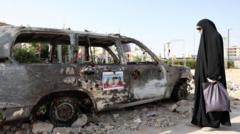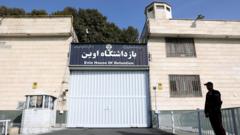In a recent social media post, former US President Donald Trump stirred debate by speculating about the possibility of regime change in Iran, following US strikes against Iranian nuclear facilities. His comments came after the US military, alongside Israel, targeted three key sites linked to Iran’s nuclear program on Saturday, amidst rising tensions in the region. Although Trump’s remarks suggested a potential shift in leadership could be beneficial for Iran, senior officials, including Defense Secretary Pete Hegseth and Vice-President JD Vance, clarified that the operations were not aimed at toppling the Iranian government.
Trump Raises Questions on Iran Regime Change Following US Strikes

Trump Raises Questions on Iran Regime Change Following US Strikes
Trump's comments on potential regime change in Iran create controversy amidst US military actions.
Trump’s use of the term "Regime Change" in his social media post, referring to Iran’s ability to "MAKE IRAN GREAT AGAIN," appeared to diverge from the official narrative emphasized by his administration. Elliott Abrams, a former envoy to Iran, remarked that Trump might be engaging in humor rather than promoting a serious policy shift. The missile strikes were intended to disrupt Iran's nuclear capabilities amid heightened hostilities, with Iran vowing to retaliate against the US and Israel for the attacks.
Following the strikes, US military personnel in the Middle East have raised their alert levels amid fears of impending Iranian retaliation. Additional tensions emerged as Iranian state media announced parliamentary approval for closing access to the Strait of Hormuz—a vital artery for global oil trade—potentially exacerbating international trade disruptions.
Emphasizing a hands-off approach to international conflicts during his campaign, Trump’s recent military engagement raises questions about his foreign policy direction, drawing criticism from various political corners, including from within his own party. The ramifications of the recent strikes and Trump’s uncertain stance on regime change could reshape US-Iran relations and impact broader Middle Eastern dynamics.
Following the strikes, US military personnel in the Middle East have raised their alert levels amid fears of impending Iranian retaliation. Additional tensions emerged as Iranian state media announced parliamentary approval for closing access to the Strait of Hormuz—a vital artery for global oil trade—potentially exacerbating international trade disruptions.
Emphasizing a hands-off approach to international conflicts during his campaign, Trump’s recent military engagement raises questions about his foreign policy direction, drawing criticism from various political corners, including from within his own party. The ramifications of the recent strikes and Trump’s uncertain stance on regime change could reshape US-Iran relations and impact broader Middle Eastern dynamics.




















